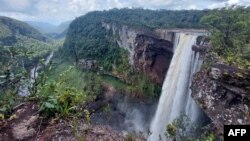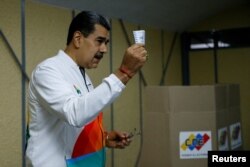Venezuela has increased pressure on its claim that the territory of Essequibo belongs to the country. However, the government of President Nicolás Maduro has little to no support from neighbors or intergovernmental organizations for the claim.
Essequibo is an area that makes up most of the South American country of Guyana, the neighbor to the east of Venezuela.
On Sunday, the Venezuelan government held a vote asking the Venezuelan people if they believed the country should declare Essequibo a Venezuelan state.
Despite media reports that showed nearly empty voting centers and other signs of low voter turnout, the Maduro government claimed that 10.5 million people voted. That is more than the last presidential election. Of those, it said 95 percent agreed in declaring Essequibo part of Venezuela.
The claim has been criticized by governments in both South America and the Caribbean. And there have been warnings from the International Court of Justice.
Last week, the court ruled that Venezuela must avoid taking any action which would change Guyana’s current control of the territory.
In recent months, Venezuela has further increased tensions by deploying its military to the border with Guyana. And it has announced that it has plans to install a landing for planes in the area to provide support for the development of Essequibo.
Over the weekend, Guyana President Mohamed Irfaan Ali said his country does not plan to surrender any territory to Venezuelan control. And he called on the Maduro government to moderate its behavior.
Ali said to his countrymen, “I want to advise Venezuela that this is an opportunity for them to show maturity, an opportunity for them to show responsibility, and we call upon them once more [to] join us in …” permitting the rule of law to work and to decide the outcome of these tensions.
Publicity stunt gone wrong
Christopher Sabatini works for Latin America at the London-based foreign policy group Chatham House. He told VOA that the vote in Venezuela had all the signs of a publicity stunt that got out of control. And it now threatens to turn into serious conflict.
Sabatini told VOA that the vote was mostly for those within the country, but the Maduro government has started something “… and we don’t know where it’s going to go.”
Roots of the dispute
Essequibo is an area of 160,000 square kilometers with little development. It makes up the western two-thirds of Guyana, a country on South America’s northern Atlantic coast.
The Venezuelan government has long claimed Essequibo. That is despite the fact that the area has been recognized by the international community, first as part of British Guiana and then as part of present-day Guyana, for more than 100 years.
The Venezuelan claim is largely based on the fact that during the colonial period, Essequibo and Venezuela were both administered by Spain. As part of a settlement reached by an international group, Essequibo was ruled to be part of British territory. All of modern-day Guyana gained independence in 1966.
The International Court of Justice is currently considering Venezuela’s claim in a request brought forward by the Maduro government in 2018. But it is believed to be years away from issuing a decision.
The border dispute gained importance in 2015. That was after oil company ExxonMobil proved that there are billions of barrels worth of oil that could be reached off the coast of Essequibo in Guyana’s territorial waters.
I’m Gregory Stachel.
Rob Garver reported this story for Voice of America. Gregory Stachel adapted it for VOA Learning English.
_______________________________________________
Words in This Story
tension – n. a state in which people, groups, or countries disagree with and feel anger toward each other
opportunity – n. an amount of time or a situation in which something can be done
maturity – n. the state of being fully developed in the body or the mind
publicity stunt – n. something done just to get the attention of the public
barrel – n. a unit of measurement of volume equal to 159 liters of oil










Forum